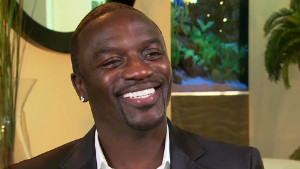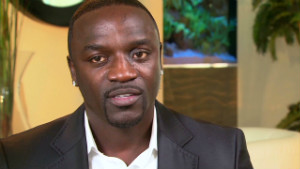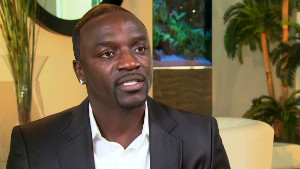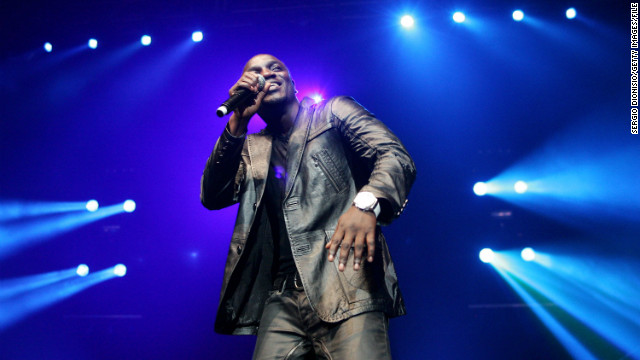Akon: Why I'm a changed man, I wanna Make AFRICA big
Akon: Why I'm a changed man
March 24, 2013 -- Updated 1323 GMT (2123 HKT)
STORY HIGHLIGHTS
- Akon is Senegalese-American multi-platinum selling artist and producer
- He has collaborated with stars including Michael Jackson and Lady Gaga
- Akon is releasing his fourth studio album in summer
- He says he wants to make a big impact in Africa
From the soundproofed
walls and floor to the large sofas and keyboard racks, there's only one
prevailing color inside Akon's state-of-the-art personal studio.
"It is all white," says
the multi-platinum selling artist, of the studio where he has recorded
and produced several of his R&B and hip hop hits. "It helps me think
a lot easier," he adds. "This is my place of creation -- I am
self-engineered, I pretty much work everything in here myself."
It's also here where the
Senegalese-American singer is putting the final touches to his fourth
studio album, expected to be released in June, nearly 10 years after he
first rose to fame with his 2004 debut offering "Trouble."
 Akon looks back on tough childhood
Akon looks back on tough childhood
 Akon: I was a bad role model
Akon: I was a bad role model
 Akon: I'm investing in Africa
Akon: I'm investing in Africa
Since then, Akon has sold
millions of albums around the world and collaborated with countless pop
and hip-hop icons such as Michael Jackson, Lady Gaga, Snoop Dog and
Eminem.
Along the way, he's also
stirred up controversy on several occasions, catching criticism for
exploiting his criminal past, as well as for his sexually explicit
lyrics and concert shenanigans.
Born in the United States
to Senegalese parents, Akon, or Aliaune Damala Badara Thiam, spent his
early years in the West African country.
"What I remember the most
really was just running wild there," he says. "Barefooted, swimming in
dirty lakes, selling fruit, picking mango trees, hoping not to get
caught because they don't take kindly to thieves in Africa," he adds,
laughing.
At around the age of 8,
Akon left the "jungle" of Senegal for the "concrete jungle" of New
Jersey. Yet, the transition into his new environment wasn't easy.
"Making friends was the
hardest part," says Akon of his school years in the United States. "I
didn't speak any English; it was a different culture, dressing
different. I would get teased a lot -- not playing the bully card -- but
I found myself always trying to find ways to fitting in. I was always
fighting."
Akon says that it was
this reality, coupled with a desire "to be cool," that sent him off the
rails during his teenage years. Aged as young as 14, he was running with
a bad crowd, involved in illegal activities including stealing cars --
which led to a six-month jail stint.
Africa was really expecting me to represent them well and at that time I don't think I was doing that.
Akon, singer
Akon, singer
Today, Akon says he feels "lucky" to have left that lifestyle behind him.
"The guys I came up
with, none of them are here right now," he says. "Four of them are dead,
three are doing double life," he adds. "It's more of a bitter-sweet
success story for me because I was the one that actually slipped away
and its only because I made the decision to change my life over after
that one experience."
But it was this
background that shaped Akon's first steps in music. In 2004, he released
his first single, "Locked Up," to great success. Two years later, his
second album, "Konvicted," reached triple platinum with three million
copies sold in the United States and more than five million worldwide by
the end of 2007.
But despite "Konvicted's" mega success, Akon says that period was a "confusing" time for him.
"All these records being
broken and all the money made, you almost want to make yourself believe
that you are invincible," he says. "I wasn't sure what I was becoming."
During a notorious Akon
concert in 2007, the singer threw a 15-year-old boy off the stage and
onto a teenage girl who suffered a concussion. "I was charged for it --
to this day, if I could have changed that, I wouldn't have did it."
During those days, Akon says, he let down Africa.
"I was the first to
break it internationally, on that level, from Africa," says the rapper.
"Africa was really expecting me to represent them well and at that time I
don't think I was doing that."
The person you see today is not the one from yesterday.
Akon, singer
Akon, singer
But that year also
marked one of his most high-profile collaborations, working in the
studio with Michael Jackson on a duet called "Hold My Hand." Akon
finished the vocals in 2009, after Jackson's death, and the song became
the first single released on the King of Pop's posthumous album titled
"Michael."
"We snuck off to go to
the movies, he had a disguise on," says Akon, recalling his
collaboration with Jackson. "It was me and his three kids and we were on
the escalator and the people were like 'Akon, oh my God, Akon,' and I
am signing autographs and laughing, thinking 'you don't even know who is
beside me' -- the whole time, he is standing there laughing."
Looking ahead, Akon says his goal is to give back to his continent. He's set up Konfidence, a Senegalese foundation that's working to build schools and hospitals in the country, he says.
"I have learned a lot
along the way and I am glad that I never regretted enough because my
past made who I am today," he says. "Just do understand that the person
you see today is not the one from yesterday.
"I am going to keep advancing, doing as much as I can, but I really want to make the biggest impact in Africa."
 Akon is a Senegalese-American
multi-platinum selling singer, well-known for his successful solo work
and his impressive roster of collaborations.
Akon is a Senegalese-American
multi-platinum selling singer, well-known for his successful solo work
and his impressive roster of collaborations.

Comments
Post a Comment